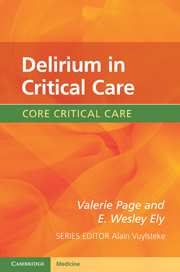Book contents
- Frontmatter
- Contents
- Foreword
- Delirium, a patient testimony
- 1 What is delirium in critical care?
- 2 How common is delirium in critical care?
- 3 What does delirium look like in critical care?
- 4 Delirium in critical care: how does it happen?
- 5 Delirium: what causes it? Risk factors
- 6 Delirium in critical care: why is it important?
- 7 Delirium in critical care: how do we diagnose it?
- 8 How to prevent delirium?
- 9 Treatment of delirium in critical care
- 10 Mental capacity and restraints
- 11 End-of-life care
- 12 What is the future?
- Selected references
- Index
- References
5 - Delirium: what causes it? Risk factors
Published online by Cambridge University Press: 05 December 2011
- Frontmatter
- Contents
- Foreword
- Delirium, a patient testimony
- 1 What is delirium in critical care?
- 2 How common is delirium in critical care?
- 3 What does delirium look like in critical care?
- 4 Delirium in critical care: how does it happen?
- 5 Delirium: what causes it? Risk factors
- 6 Delirium in critical care: why is it important?
- 7 Delirium in critical care: how do we diagnose it?
- 8 How to prevent delirium?
- 9 Treatment of delirium in critical care
- 10 Mental capacity and restraints
- 11 End-of-life care
- 12 What is the future?
- Selected references
- Index
- References
Summary
Introduction
Delirium is serious. A good clinician is keen to reduce the number of patients who develop this syndrome. But what causes delirium? Are some patients more susceptible than others? Should we routinely screen for delirium? If yes, which group of patients?
Good questions but we don't have all the answers… just a few which we will explore in this chapter.
Considering that the pathophysiology is still unclear, it is not surprising that studies to establish what puts a patient more at risk of developing delirium come up with a number of different answers. If we understood the mechanisms, then we would be able to explore with greater accuracy the predisposing and precipitating factors. Risk factors cover a wide range of disparate patient characteristics and illnesses, often related to the various mechanistic hypotheses that include inflammation, lack of oxygen supply, neurotransmitter imbalance caused by drugs, ageing process, or all the above… No less than 61 risk factors were identified out of 27 prospective studies including 1365 patients with delirium.
We know that critically ill patients are particularly at risk of delirium and we need to screen all critically ill patients regularly, at least daily. Risk factors can be controlled (to some extent) and delirium can be managed (sometimes) but only if we know it is present.
- Type
- Chapter
- Information
- Delirium in Critical Care , pp. 68 - 93Publisher: Cambridge University PressPrint publication year: 2011

